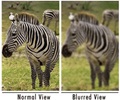Researchers at the University of Maryland have developed a method that helps an adult recover function in an eye that has been damaged and dysfunctional from birth.
Researchers at the University of Maryland have developed a method that helps an adult recover function in an eye that has been damaged and dysfunctional from birth.
The study may help treat Amblyopia, or lazy eye as it showed that complete visual loss promoted subsequent recovery in an eye that has had severely compromised vision throughout life.Clinical studies have demonstrated that the probability to recover amblyopia, caused by unilateral cataract, depended on the age at which the cataract was removed. The probability to recover fully was maximum when the cataract was removed by the age of three.
As part of the study Hai-Yan He, Baishali Ray and Katie Dennis, by blocking the input into one eye from eye-opening to adulthood, mimicked a unilateral cataract in a rodent model.
Similar to what cataract does, the experimental occlusion caused rapid fall in deprived eye’s acuity. Earlier researches have established that an eye cannot recover normal visual function if the occlusion was removed in adulthood.
“However, when we placed the subjects into a light-tight dark room for a period of complete visual deprivation prior to removing the occlusion, we were able to produce a rapid recovery of visual acuity after removal of the occlusion” Nature quoted Yan He, as saying.
“Dark exposure drives down the strength of the synapses serving the two eyes, restoring the symmetry that was previously lacking in the amblyopic adult,” Quinlan said.
Advertisement
Source-ANI
LIN/J










